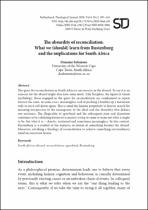| dc.contributor.author | Solomons, Demaine | |
| dc.date.accessioned | 2022-05-26T09:08:05Z | |
| dc.date.available | 2022-05-26T09:08:05Z | |
| dc.date.issued | 2020 | |
| dc.identifier.citation | Solomons, D. (2020). The absurdity of reconciliation. What we (should) learn from Rustenburg and the implications for South Africa. tellenbosch Theological Journal 2020, 6(2), 395-414. http://dx.doi.org/10.17570/stj.2020.v6n4.a18 | en_US |
| dc.identifier.issn | 2226-2385 | |
| dc.identifier.uri | http://dx.doi.org/10.17570/stj.2020.v6n4.a18 | |
| dc.identifier.uri | http://hdl.handle.net/10566/7463 | |
| dc.description.abstract | The quest for reconciliation in South Africa is an exercise in the absurd. To say it is an
exercise for the absurd might also have some merit. Like Sisyphus, the figure in Greek
mythology, those engaged in the quest for reconciliation are condemned to repeat
forever the same, in some cases, meaningless task of pushing a boulder up a mountain
only to see it roll down again. This is amid the human propensity to forever search for
meaning irrespective of the incongruity of the ideal and the absurdity that defines
our existence. The illogicality of apartheid and the subsequent pain and alienation
continues to be a defining feature of a country trying to come to terms not what it ought
to be, but what it is – chaotic, irrational and sometimes meaningless. In this context,
Rustenburg is a symbol of the audacity to dream of something beyond the absurd.
Moreover, invoking a theology of reconciliation to achieve something extraordinary
amid an uncertain future. | en_US |
| dc.language.iso | en | en_US |
| dc.publisher | Pieter de Waal Neethling Trust | en_US |
| dc.subject | Absurd | en_US |
| dc.subject | Reconciliation | en_US |
| dc.subject | Apartheid | en_US |
| dc.subject | South Africa | en_US |
| dc.subject | Rustenburg | en_US |
| dc.title | The absurdity of reconciliation. What we (should) learn from Rustenburg and the implications for South Africa | en_US |
| dc.type | Article | en_US |

